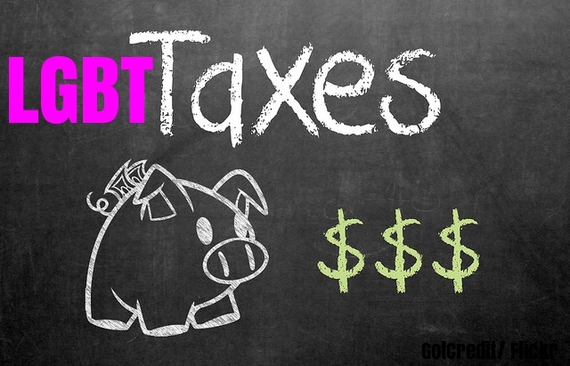
How's this for a milestone? 2016 marks the first year that many same sex couples are filing joint returns. Here's what to know and what to do so that tax time doesn't sabotage your wedded bliss.
My husband and I have just finished slogging through our taxes and filing our returns and we're still speaking. Whether you've been together for years or decades, as newlyweds your 2015 taxes may be the first time as an LGBT married couple you'll be filing jointly on your federal return.
Filing taxes is complicated enough, but your first time filing as a married couple may throw you off the balance if you've been filing separately until now. As a financial planner what I want for all my couples is to show you ways to (legally) keep more of your hard earned money for the good times ahead.
Alas, federal recognition may bring with it the dreaded marriage penalty, so it literally pays to be proactive about your taxes. Please don't wait until 11:47 p.m. on April 15th and risk getting shocked by a surprisingly high bill from the tax man or miss deadlines for various tax saving opportunities. Trust me, paying more taxes than you owe or racking up interest and penalties is nobody's idea of romance.
From my household to yours, here are a few things you should do now to be tax-wise this season and beyond:
- Talk the 'Money Talk,' repeat as necessary.
I'm not joking when I say that the IRS gives couples a gift by forcing them to discuss their finances at least once a year. Read my lips: In order to function as a team, couples must talk about money, talk openly and talk often. Couples fight about money, true. Filing taxes is stressful and a big pain in the butt, also true. But when it comes to budget, ignorance is most definitely not bliss. A potentially big financial blowup is too high a price to pay just to avoid a possibly uncomfortable conversation.
Schedule some time with your significant other to sit down uninterrupted and share a nice bottle of wine. Discuss your financial goals and where you are financially, both as individuals and as a couple. Put this in writing. Gather your tax docs and make an appointment with your wonderful CPA, or schedule a session to suffer through your own do it yourself TurboTax data entry. And if the dog did happen to eat some of your tax forms (I know, I know, it happens), don't ignore this until April 15th, do what you need to do to get copies now.
-Don't get blindsided by the 'Marriage Penalty'
While some couples may end up with a 'marriage bonus,' I'm willing to bet many of you reading this will get hit with the dreaded 'marriage penalty.' I know whereof I speak; my husband and I have sure gotten whacked with it.
Now that you're a married couple, some deductions may now make sense that didn't in the past. On the other hand, you may end up in a higher tax bracket with your money pooled together, or your new, higher combined incomes may reduce other potential tax deductions. If this is your first year filing together, I highly recommend having your CPA produce a detailed review of your financial situation to avoid any surprises come tax time.
-Don't shortchange your future, invest in yourself.
Is financial security appealing to you? Any interest in lowering your tax bill? Do you want to retire some day? If you answered yes, contributing to your retirement accounts can be a win-win. The money you contribute to a 401(k) or an IRA is excluded from your taxable income, helping you reduce your overall tax bill. Picture how all that money can now be invested to help build your retirement nest egg so the two of you can reach a ripe old age together in comfort.
I'm sure you'd rather write a check to yourself than dear old Uncle Sam. You have until tax time to fully fund an IRA or Roth IRA if you qualify for 2015. That can be another $5500 deduction each $11000 for you as a couple. $6500/$13000 for those over 50. If one spouse does not work, you can now also take advantage of a spousal IRA, further lowering your tax bill.
-Review your prior years' tax returns, you might find gold at the end of tax return rainbow
If you were legally married in your state (as in California, Oregon and Florida for example) prior to June 2015 but not receiving federal recognition, you may be able to revisit your tax returns for up to three years prior. You can refile those returns as a married couple which will then SAVE YOU TAXES. I've worked with many people who were able to get thousands back with amended tax returns. It never hurts to check and see if you are owed a refund.
-Give your portfolio a check-up
Saving money on taxes within your portfolio is like earning an additional return on your investment without taking any more risk. Ask your financial planner if there are any tax saving opportunities in your nonretirement accounts. There may be places you can reduce the tax drag on your accounts, and it's always good to give your portfolio a check-up every so often.
-Talley up your generosity
Did you do some winter cleaning? Did any of your junk become someone else's treasure after being donated to a charity? You've done some good and now you may get a nice tax deduction as long as you got a receipt at the donation site. When donating funds, use a check or credit card to ensure you have easy proof of your largesse in case the IRS questions your contributions. You may be surprised how all those donations to the Aids/LifeCycle and other charities add up, and can mean big tax savings. As far as the IRS is concerned, your karma pays a dividend. As far as I your friendly Certified Financial Planner™ am concerned, this is certainly appropriate.
As a couple, romance was what got you together but reality is what keeps you together. Once the honeymoon is over, money matters are very much a part of that reality. Working with trustworthy financial professionals will enable you to avail yourself of all the opportunities our newfound marriage equality grants us tax-wise. Remember, financial prosperity is not just about how much you make but how much you keep . . . together.
Until Next time, as always Be Fiscally Fabulous!
DAVID RAE, CFP®, AIF® is a Los Angeles-based retirement planning adviser with Trilogy Financial Services, a regular contributor to the Advocate Magazine and a financial planner proudly serving friends of the LGBT community for over a decade. Follow him on Facebook or via his website, www.davidraefp.com.
Securities and advisory services offered through National Planning Corporation (NPC), Member FINRA/SIPC, a Registered Investment Adviser. Additional advisory services offered through Trilogy Capital, a Registered Investment Adviser. Trilogy Capital and NPC are separate and unrelated companies. NPC does not provide tax or legal advice.


